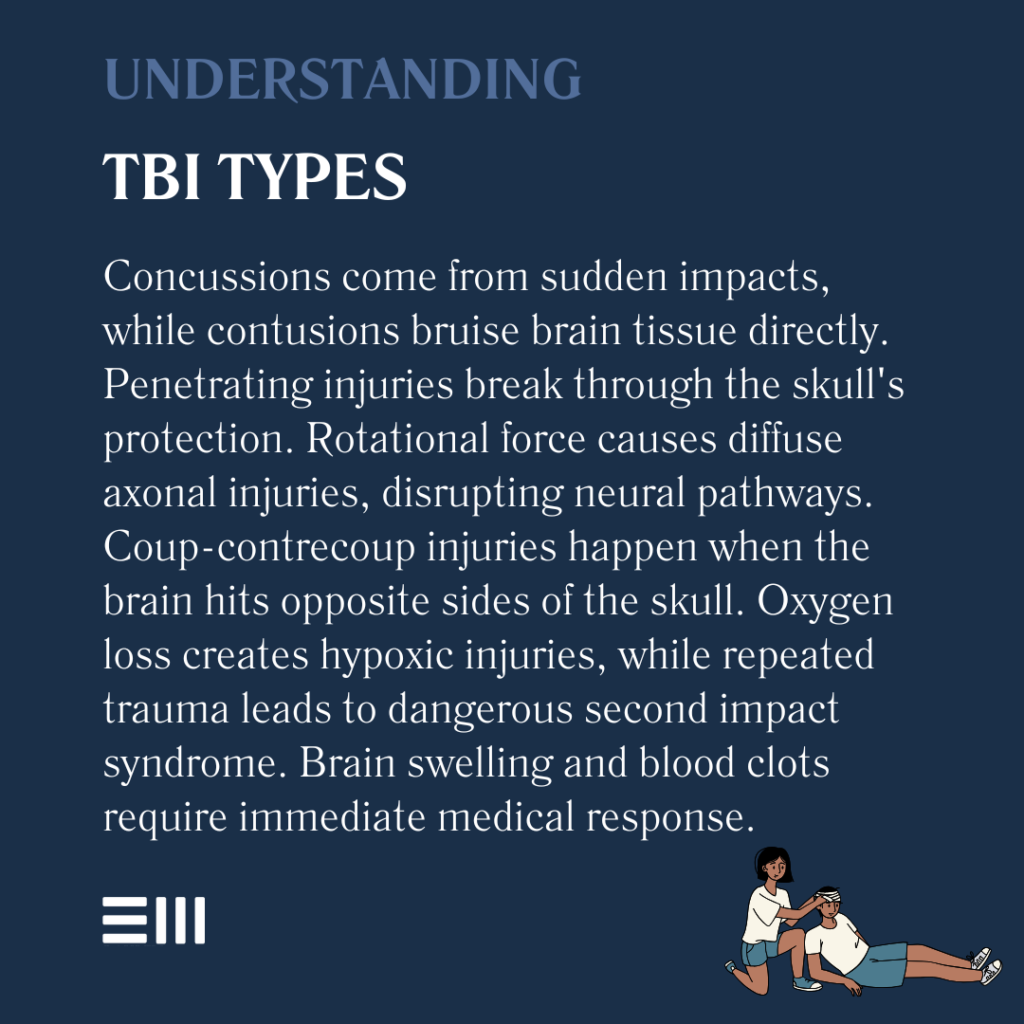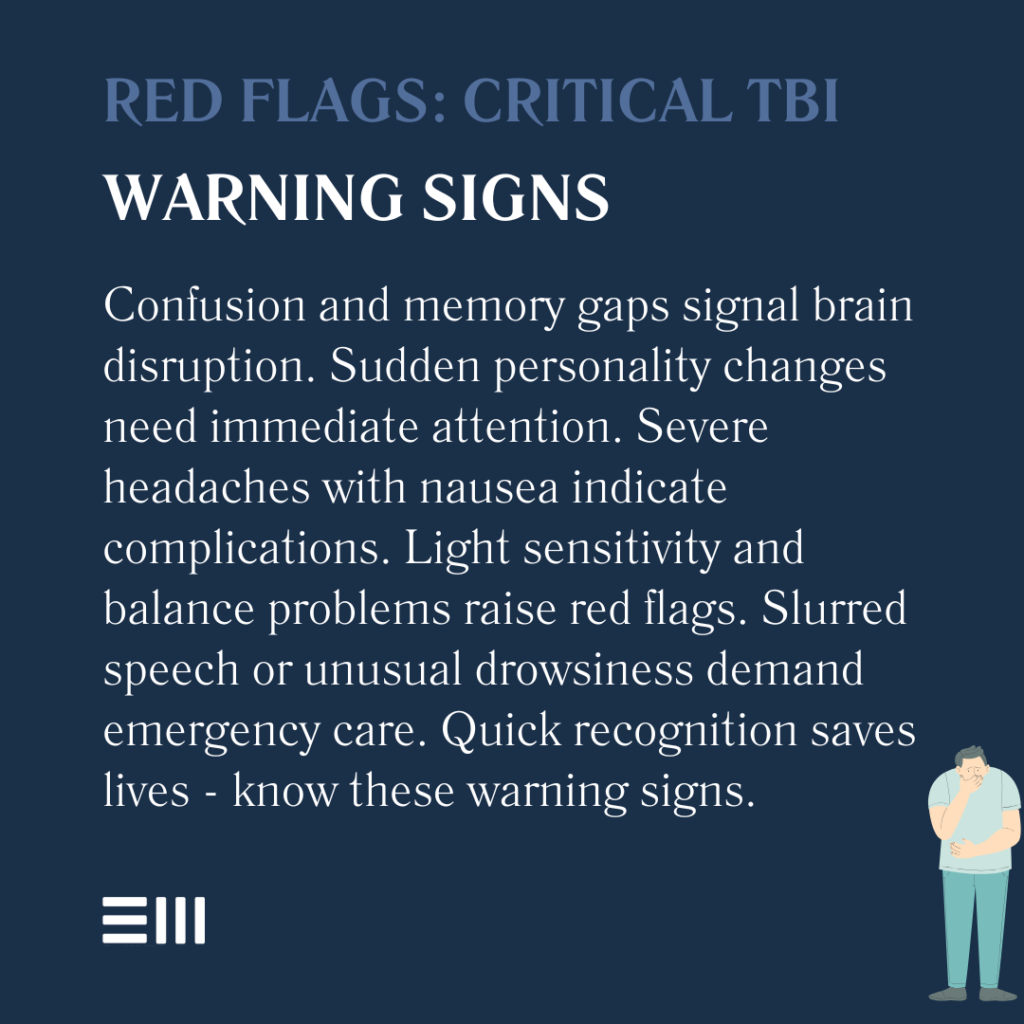
Nearly 3 million Americans visit emergency departments for traumatic brain injuries each year – that’s one person every 21 seconds.
Behind each of these statistics lies a family forever changed, grappling with profound physical, emotional, and financial challenges.
In Alabama, understanding your rights and options after a TBI is the first step toward securing the support needed for long-term recovery.
Understanding Traumatic Brain Injuries
Life-altering moments happen in milliseconds. Whether from a car crash, workplace accident, or slip and fall, traumatic brain injuries can transform daily routines into mounting challenges. The human brain’s complexity means that no two injuries are identical, requiring personalized medical and legal approaches for each situation.
Types of Traumatic Brain Injuries
Medical professionals categorize brain injuries into several distinct types, each requiring specialized treatment approaches and carrying unique long-term implications.
- Concussions from direct blows or whiplash;
- Contusions causing brain tissue bruising;
- Penetrating injuries from skull fractures;
- Diffuse axonal injuries from severe rotation;
- Coup-contrecoup injuries from impact force;
- Hypoxic brain injuries from oxygen deprivation;
- Second impact syndrome from repeated trauma;
- Cerebral edema (brain swelling);
- Hematomas (blood clots in or around the brain); and
- Post-concussion syndrome.
Understanding these distinct types helps determine appropriate treatment paths and potential compensation needs. Early identification of injury type often leads to better outcomes and more targeted treatment strategies.

Common Causes in Alabama
Analysis of Alabama’s emergency department data reveals specific patterns in how these life-changing injuries occur in our state.
- Motor vehicle accidents;
- Falls, especially in construction;
- Workplace incidents;
- Sports injuries;
- Acts of violence;
- Recreational vehicle accidents;
- Medical malpractice; and
- Product malfunction injuries.
Understanding the cause helps determine liability and shapes the approach to seeking compensation.
Recognizing Cognitive Impairment Signs
Early recognition of cognitive changes can significantly impact recovery outcomes. Family members often notice these subtle shifts before medical professionals, making their observations crucial for diagnosis and treatment.
Immediate Signs to Watch For
The first hours and days following a traumatic brain injury are critical for identifying potential complications and beginning appropriate treatment protocols.
- Confusion and disorientation;
- Memory problems, especially with recent events;
- Difficulty concentrating or focusing;
- Slowed thinking or processing speed;
- Changes in sleep patterns;
- Mood swings or personality changes;
- Balance and coordination issues;
- Sensitivity to light or noise;
- Persistent headaches;
- Nausea or vomiting;
- Dilation of one or both pupils;
- Slurred speech;
- Loss of consciousness; and
- Seizures or convulsions.
These symptoms may appear immediately or develop over days and weeks following injury. Prompt medical attention for any of these signs can prevent secondary complications and improve long-term outcomes.

Long-term Cognitive Effects
The enduring impact of a traumatic brain injury often extends far beyond the initial recovery period, affecting every aspect of daily life.
- Persistent memory difficulties;
- Executive function challenges;
- Communication barriers;
- Behavioral changes;
- Learning difficulties;
- Reduced problem-solving abilities;
- Emotional regulation issues;
- Social interaction challenges;
- Depression and anxiety;
- Career limitation impacts;
- Relationship strain;
- Financial management difficulties;
- Reduced independence; and
- Changes in personal identity perception.
Long-term effects often require ongoing medical care and support systems, impacting both the injured person and their family. Creating comprehensive support networks becomes essential for managing these challenges effectively.
Medical and Legal Documentation
Proper documentation strengthens both medical treatment plans and legal claims. Creating a comprehensive record helps establish the connection between the injury and its impacts on daily life.
Essential Medical Records
Gathering and organizing medical documentation creates a clear picture of injury progression and treatment effectiveness for healthcare providers and legal proceedings.
- Emergency room visits and admissions;
- Diagnostic imaging results;
- Treatment plans and modifications;
- Therapy session notes;
- Medication records;
- Specialist consultations;
- Recovery progress reports;
- Future care recommendations;
- Rehabilitation assessments;
- Mental health evaluations;
- Physical therapy progress notes;
- Occupational therapy reports;
- Speech therapy documentation; and
- Neuropsychological testing results.
These records form the foundation for both ongoing care and legal proceedings. Regular updates and organized record-keeping strengthen the documentation of injury impact.
Important Legal Documentation
Building a strong legal case requires comprehensive documentation beyond medical records to illustrate the full scope of injury impact.
- Accident reports and police records;
- Witness statements;
- Insurance correspondence;
- Employment impact statements;
- Daily symptom journals;
- Financial records of expenses;
- Photography of visible injuries;
- Video documentation of recovery;
- Expert witness testimonies;
- Workplace incident reports;
- Safety violation documentation;
- Income loss verification;
- Property damage evidence; and
- Quality of life impact statements.
Thorough documentation helps demonstrate the full scope of injury impact. Working with legal professionals ensures all necessary documentation is properly collected and preserved.
Frequently Asked Questions About TBI Cases in Alabama
Understanding traumatic brain injuries and legal rights can feel overwhelming.
Here are answers to common questions our clients ask when seeking guidance for their TBI cases.
How Long Do I Have to File a TBI Claim in Alabama?
Alabama’s statute of limitations sets specific timeframes for legal action, making timing a crucial factor in protecting your rights.
In Alabama, you typically have two years from the date of injury to file a legal claim. However, certain circumstances might extend or shorten this timeline, making prompt legal consultation essential.
What Compensation Can I Seek for a TBI?
Understanding the full scope of available compensation helps ensure you pursue all appropriate damages for your injury.
Recovery may include:
- Current and future medical expenses;
- Lost wages and earning capacity;
- Future care costs;
- Pain and suffering;
- Lifestyle modifications;
- Home and vehicle adaptations;
- Caregiver expenses;
- Rehabilitation costs;
- Emotional distress;
- Loss of consortium; and
- Punitive damages in cases of gross negligence.
Each case’s value depends on injury severity and impact on daily life.
How Can I Prove Cognitive Impairment in Court?
Building a strong case requires multiple forms of evidence to demonstrate the reality and impact of cognitive changes.
- Medical documentation;
- Expert testimony;
- Neuropsychological evaluations;
- Witness statements about behavioral changes;
- Before and after job performance records;
- Daily living activity assessments;
- Family impact statements; and
- Video evidence of functional changes.
Will My Insurance Cover TBI Treatment?
Navigating insurance coverage for TBI treatment involves understanding multiple potential sources of support.
Coverage varies by policy and injury cause. Professional legal guidance can help maximize insurance benefits and identify additional compensation sources.
How Long Does Recovery Take?
The journey to recovery after a TBI varies significantly among individuals.
Recovery timelines vary significantly. While some symptoms improve within months, others may require years of rehabilitation or result in permanent changes requiring ongoing support.
Contact Our TBI Legal Team for a Confidential Consultation
Every moment counts when dealing with traumatic brain injuries. Whether you’re seeking answers for yourself or a loved one, taking action now can protect your future rights and access to care.
Our experienced catastrophic injury attorneys understand the complex medical and legal challenges you face.
We’re ready to evaluate your case, explain your options, and help secure the support you need for recovery.
Can't find what you're looking for? Search our site below.










